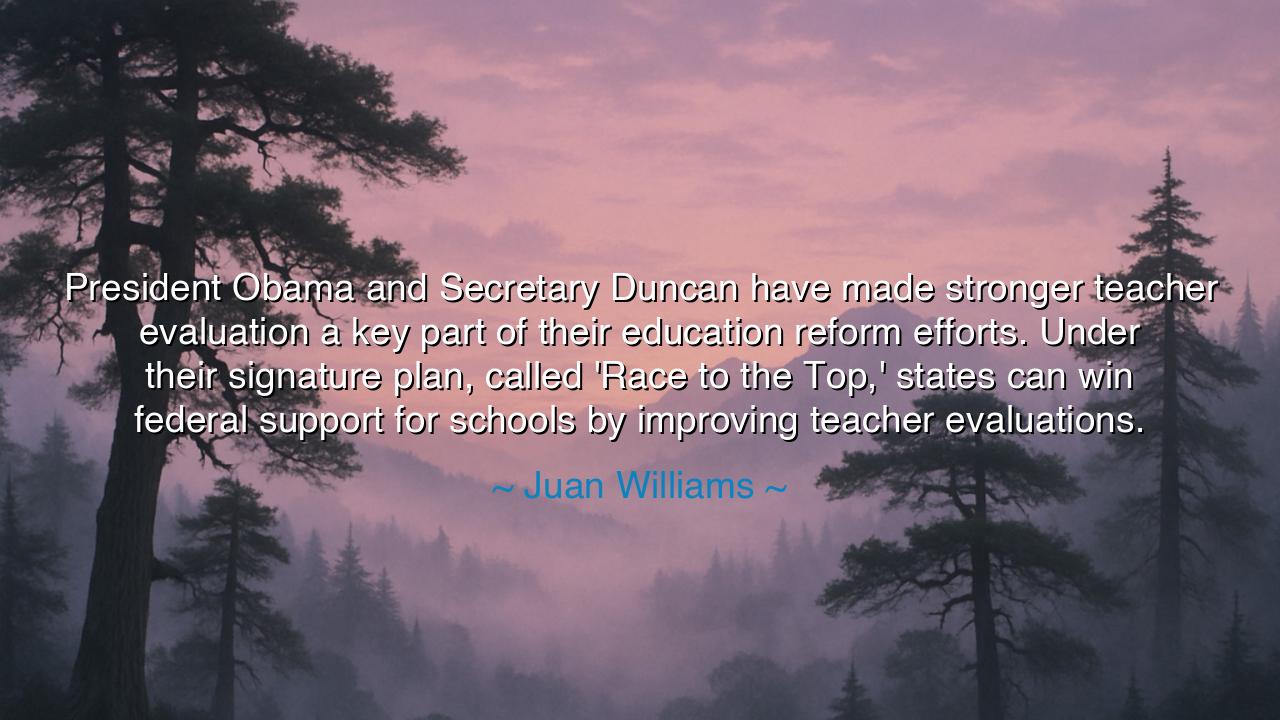
President Obama and Secretary Duncan have made stronger teacher
President Obama and Secretary Duncan have made stronger teacher evaluation a key part of their education reform efforts. Under their signature plan, called 'Race to the Top,' states can win federal support for schools by improving teacher evaluations.






Hear the words of Juan Williams, who wrote of a great struggle in the shaping of a nation’s future: “President Obama and Secretary Duncan have made stronger teacher evaluation a key part of their education reform efforts. Under their signature plan, called ‘Race to the Top,’ states can win federal support for schools by improving teacher evaluations.” This statement, though born in the age of modern policy, carries echoes as old as civilization itself—the question of how to nurture the minds of the young, how to strengthen those entrusted with the sacred duty of teaching, and how to ensure that the builders of tomorrow are well guided today.
For the teacher is no ordinary worker. The farmer tends the soil, the mason lays the stone, but the teacher shapes the very souls of men and women. To measure such a calling is not an act of cruelty, but of necessity. If the hand that guides the future is weak or careless, the entire generation stumbles. Thus, Obama and Duncan sought to reform the system, declaring that the excellence of education depends first and foremost upon the strength of those who stand at the head of the classroom. And so they placed their faith in the power of evaluation, believing that truth about performance, once revealed, could lead to renewal.
History, too, bears witness to this eternal theme. Recall the great Academy of Athens, where Plato gathered his disciples. He did not permit idleness nor allow mediocrity to pass unchallenged. His pupils were tested with questions sharp as swords, their reasoning forged in the fires of dialogue. This was evaluation, not in numbers or paperwork, but in the very essence of intellectual trial. From such rigorous shaping arose men like Aristotle, who himself would become a pillar of thought for ages to come. Without the testing of teachers and students alike, wisdom fades into complacency.
Consider also the reforms of Confucius, who in ancient China declared that society rises or falls on the virtue of its teachers. To ensure their worth, imperial systems later devised examinations so rigorous that only the most dedicated and wise could pass. These tests, though harsh, ensured that those who guided the young bore the strength of both knowledge and character. What Obama and Duncan sought in modern form echoes this same principle: that the shepherds of youth must themselves be judged, so that their flocks may not wander astray.
Yet Williams also reminds us of the paradox. For though the plan was called ‘Race to the Top,’ the true struggle is not a race against one another, but a race against mediocrity, against ignorance, against the slow decay that comes when education fails. Federal support, like a prize, was offered to those who dared to reform. But the deeper prize was never money—it was the chance to awaken schools, to honor good teachers, and to call forth accountability from those who had grown weary in their duty.
But let us not mistake evaluation for mere judgment. Its true purpose is not to condemn but to uplift, not to punish but to sharpen. The sword, left unsharpened, grows dull; the teacher, left untested, may falter. Yet with honest feedback, with support and guidance, the teacher grows stronger, and through them the whole generation flourishes. Thus, the reform was not an act of tyranny, but a call to excellence.
Therefore, O listeners, take this lesson: whether you are a teacher, a student, or a leader in your craft, do not shun evaluation. Welcome it as the athlete welcomes training, as the scholar welcomes challenge. For in being tested, you are refined, and in being refined, you become worthy of the trust others place in you. The greatness of a people depends on the strength of its guides, and the strength of its guides depends on their willingness to be measured.
Practical counsel I give: seek feedback with humility, examine yourself honestly, and strive always for growth. If you are entrusted with leadership, ensure that evaluation is fair, purposeful, and aimed at building rather than breaking. And if you are a student of life, remember that every critique, every test, every trial is an invitation to rise. For as Williams reminds us through the deeds of his age, the true Race to the Top is not a contest of speed, but a lifelong climb toward wisdom, discipline, and the flourishing of generations yet to come.






AAdministratorAdministrator
Welcome, honored guests. Please leave a comment, we will respond soon